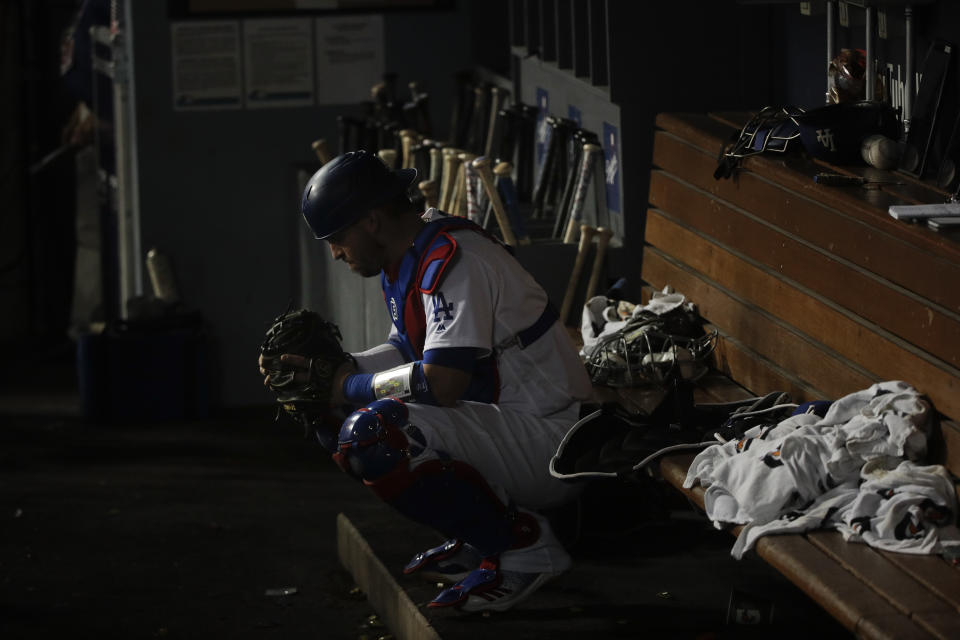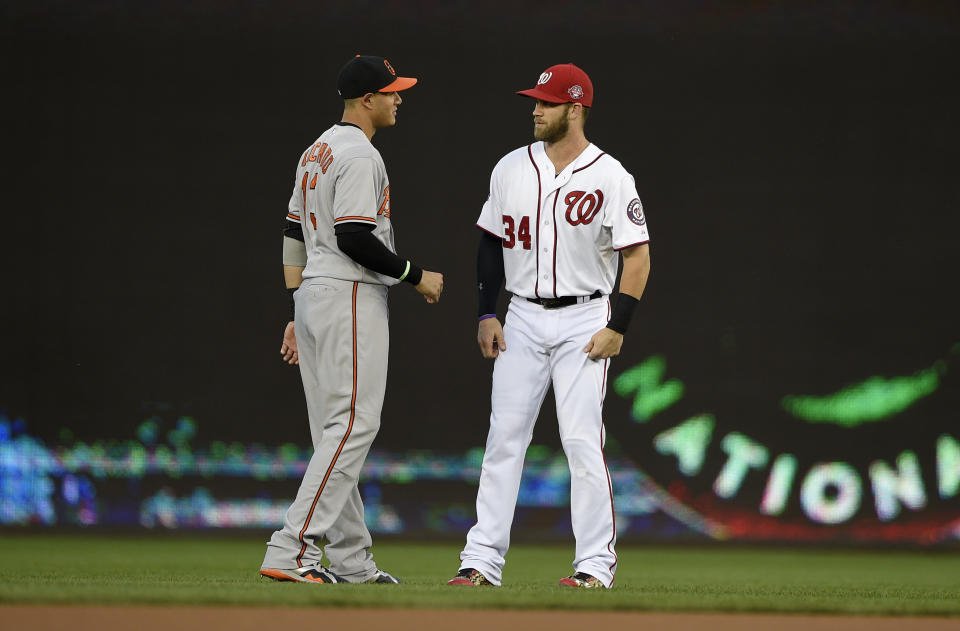MLB free agency is broken, and desperately needs to be fixed
Another glacial Major League Baseball offseason was briefly interrupted by a glimmer of hope Wednesday. One of the premier free agents had signed. Perhaps this would be the thing that finally opened the floodgates.
That joy faded the instant the contract terms were announced. One of the most coveted players on the free-agent market — a 30-year-old standout at a scarce position — took a one-year deal. It was yet another sign that baseball’s economy is broken, and desperately needs to be fixed.
Yasmani Grandal had plenty of reasons to be optimistic about hitting the free-agent market. Productive catchers rarely reach free agency. They are such rare assets that teams spring on any opportunity to lock them up to long-term extensions before they ever have a chance to leave. While he struggled in the postseason, Grandal did enough during his four seasons with the Los Angeles Dodgers to prove he was easily a top-5 catcher in baseball. Given the dearth at the catching position across the league, teams should have been lining up to sign him.
There was no multi-year deal waiting for Grandal. Instead, he agreed to a one-year, $18.25 million deal with the Milwaukee Brewers.
There were rumors he was offered more. Grandal reportedly turned down a four-year, $60 million deal from the New York Mets earlier in the offseason. It’s fair to question whether that was the actual offer, especially considering which side would leak that information. But even if it was true, it’s puzzling that Grandal’s choices boiled down to a $60 million contract or a one-year deal. No other team was willing to offer something in between?

This is a clear departure from how baseball has operated in the past. In 2015, Russell Martin signed a five-year, $82 million deal with the Toronto Blue Jays. Grandal, who is two years younger than Martin was during free agency, couldn’t top, or come anywhere close to, Martin’s deal.
In Martin’s case, the Blue Jays knew Martin’s deal would hurt at the end, but that the rough years would come after the team’s contention window had closed. Martin played a key role in the Blue Jays finally making the playoffs. His $20 million salary hasn’t negatively impacted the Blue Jays now because the team is clearly playing for the future. They were prepared for this.
There’s a notion that teams have gotten smart and changed tactics when it comes to free agency. Older players like Martin are no longer receiving mega-deals because teams know those players are bad investments. It’s a compelling argument because it carries a kernel of truth. Thirty-five year olds rarely make the All-Star Game.
But there’s a difference between being smart and being cheap. Some have suggested players and agents need to adjust by taking short-term deals with higher salaries, but those haven’t materialized. The Oakland Athletics could have easily offered Grandal a two-year, $40 million deal, but didn’t. They’ll instead attempt to repeat their 97-win season with Josh Phegley starting at catcher.
Those types of deals aren’t going to be offered because the gap between contention and rebuilding has never been wider. Only a handful of teams are truly trying to improve this winter. The rest are either standing still or actively shedding salary.
It’s reached a point where two of the best players to ever hit the free-agent market — Bryce Harper and Manny Machado — are only being courted by three or four teams. Harper and Machado are franchise-altering players who can single-handedly boost a team’s revenue. This isn’t a situation where only three or four teams have legitimate shots at signing Harper or Machado, it’s that only three or four teams are actually trying to sign them.
Even teams that have shown a willingness to carry high payrolls — the New York Yankees and Chicago Cubs — are crying poor this offseason. The Yankees have made it clear they will not exceed the luxury tax. In the past, this was never an issue. The team gladly paid the penalties associated with buying the best players in the game. That strategy resulted in a lot of winning. Despite resetting the team’s luxury tax penalty in 2018, the Yankees have reversed course and will no longer exceed the tax. The Yankees aren’t the only team taking this approach. Every team is doing it.

The players are not blameless here. They agreed to a bad deal during the last collective-bargaining agreement negotiations in 2016. In their haste to strike down an international draft, the players agreed to a system that capped international spending, allowed luxury tax penalties to get stronger — giving teams more incentive to treat the luxury tax like a salary cap — and accepted a modified qualifying offer system that’s no better than the previous one.
There’s a segment of fans who respond to that by saying, “Too bad,” but that’s a cruel and heartless approach. It’s always going to be a tough sell to convince fans that players who make millions of dollars are underpaid, but the game has supported those salaries in the past, and should be able to support them even more now.
Baseball revenues are at an all-time high. MLB brought in $10.3 billion in 2018. That figure doesn’t include the $50 million each team received from the sale of MLB Advanced Media to Disney. Even the Miami Marlins — at the time considered one of the worst-run franchises in baseball — sold for $1.2 billion in 2017. The San Francisco Giants just accepted a new stadium deal worth at least $300 million.
Problem is, that money isn’t being used to improve teams. There are legitimate reasons for certain teams to not spend massive amounts on free agents, but those teams no longer have other outlets to spend. Teams can’t massively outspend other teams in the draft due to strict draft-slot values, and teams can no longer throw money at international free agents. This offseason has proved that money isn’t being saved up for future big-time free agents, either. It’s being pocketed by the team.
These are the reasons many believe a strike is coming. Players have now experienced two straight dismal free-agent periods. Harper and Machado will eventually sign — likely for large amounts — but those deals will come after an offseason where only a few teams showed interest in those elite stars. Other players won’t be so lucky.
There are no easy fixes here. The players will have to stand firm on a number of changes in order to balance the scales during the next CBA negotiations. Giving teams fewer years of control on draftees could help. Lessening luxury tax penalties and getting rid of capped spending on the draft and international market would represent a step in the right direction. Eliminating the qualifying offer system entirely and instituting a salary floor, or something that ensures every team spends money, will get them closer. On top of all that, making sure future union members — minor leaguers — are paid a living wage is crucial. Those aren’t exactly things the owners will accept without a fight.
The players have three seasons to prepare for that battle. The CBA expires Dec. 1, 2021. Given the contentious nature of those major issues, a lengthy strike seems not only likely, but necessary. The balance of power within the game has shifted far too much over the last two seasons.
Just ask Yasmani Grandal.
– – – – – – –
More from Yahoo Sports:
• Cardinals clap back at ESPN’s Stephen A. Smith
• Coach gives Saints $225K reasons to be motivated
• MVP performance: Giannis outduels Harden
• Paylor: How Mahomes can help Chiefs avoid playoff flop
